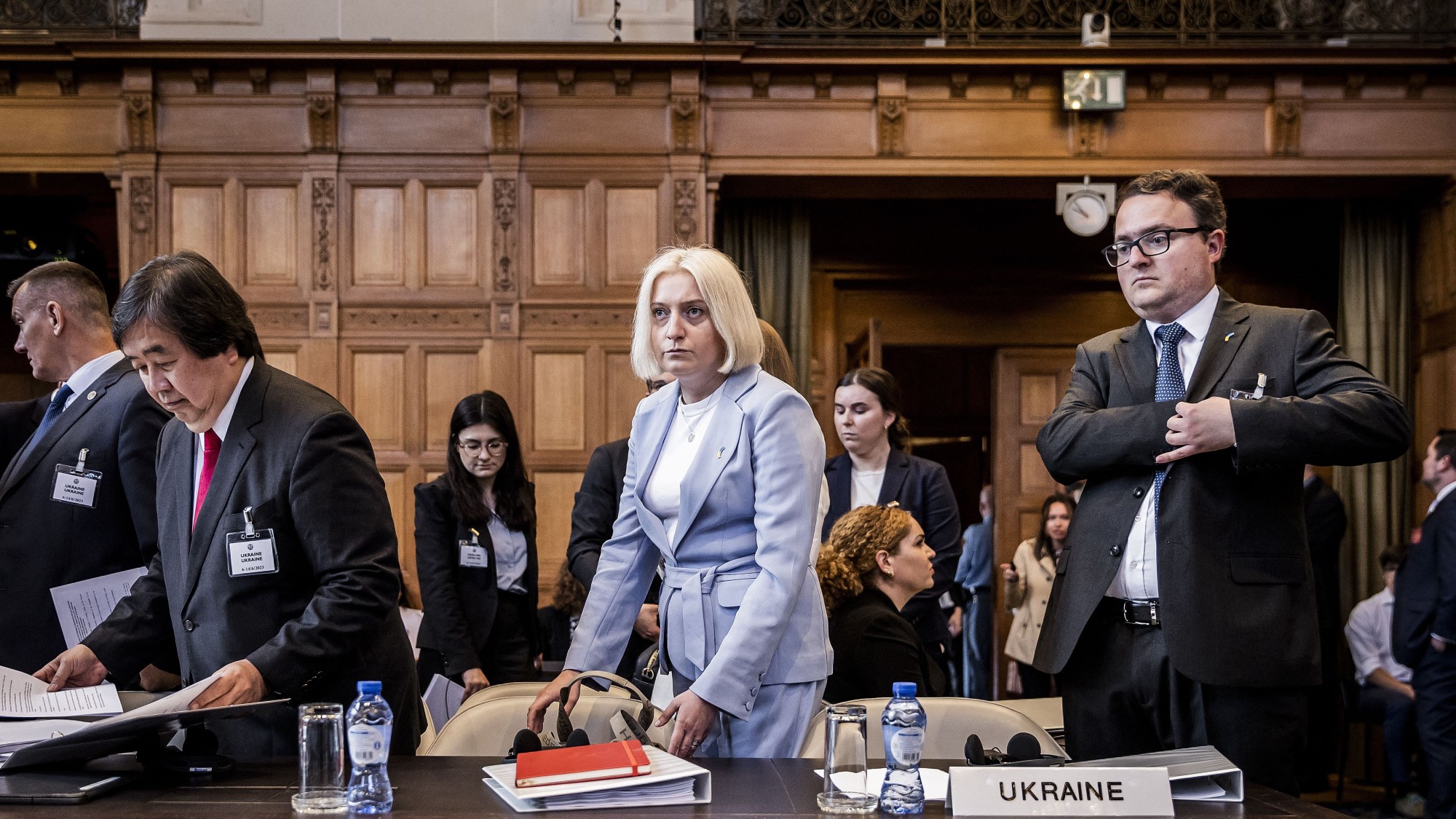Russia and Ukraine face off in The Hague over genocide case
Kyiv is hoping the UN's highest court will rule Russia's actions illegal but Moscow wants the case dismissed

A free daily email with the biggest news stories of the day – and the best features from TheWeek.com
You are now subscribed
Your newsletter sign-up was successful
Russia and Ukraine face each other at the International Court of Justice (ICJ) in The Hague this week over claims by Moscow that the purpose of its invasion of Ukraine was to prevent genocide.
Kyiv has brought a case against Russia, arguing that it is "abusing" the 1948 Genocide Convention, said Reuters, by suggesting military action was justified to stop an alleged genocide in eastern Ukraine.
However, Moscow has responded by "demanding the case be thrown out" of the United Nations' highest court. Its lawyers described the Ukrainian argument as I willan "abuse of process", Euronews added.
The Week
Escape your echo chamber. Get the facts behind the news, plus analysis from multiple perspectives.

Sign up for The Week's Free Newsletters
From our morning news briefing to a weekly Good News Newsletter, get the best of The Week delivered directly to your inbox.
From our morning news briefing to a weekly Good News Newsletter, get the best of The Week delivered directly to your inbox.
Ukraine launched proceedings within days of Russia's invasion being launched. It asked the court to halt the invasion and also alleged that Moscow was "planning genocidal acts in Ukraine", The Associated Press reported.
But lawyers for Russia maintain the court "does not have jurisdiction" in this area. They have argued the Genocide Convention "cannot be used to regulate use of force by nations", the news agency added.
In hearings that began today, "the ICJ's complete jurisdiction needs to be established", said DW. And legal expert Sergey Vasiliev, associate professor of law at the University of Amsterdam, told the news site that "the decision could go either way".
The court's decision on its jurisdiction is expected to be made "relatively quickly in the coming months".
A free daily email with the biggest news stories of the day – and the best features from TheWeek.com
If it rules that it can judge the case and it then subsequently rules in Ukraine's favour, it would be "a clear finding from the principal judicial organ of the United Nations that Russia should be held responsible as a state and that it may also be ordered to pay reparations", said Vasiliev.
But he also pointed out that it could take "several years to get the final judgment".
The UN's 1948 Genocide Convention defines genocide as crimes committed "with intent to destroy, in whole or in part, a national, ethnical, racial or religious group, as such".
Rebekah Evans joined The Week as newsletter editor in 2023 and has written on subjects ranging from Ukraine and Afghanistan to fast fashion and "brotox". She started her career at Reach plc, where she cut her teeth on news, before pivoting into personal finance at the height of the pandemic and cost-of-living crisis. Social affairs is another of her passions, and she has interviewed people from across the world and from all walks of life. Rebekah completed an NCTJ with the Press Association and has written for publications including The Guardian, The Week magazine, the Press Association and local newspapers.
-
 The EU’s war on fast fashion
The EU’s war on fast fashionIn the Spotlight Bloc launches investigation into Shein over sale of weapons and ‘childlike’ sex dolls, alongside efforts to tax e-commerce giants and combat textile waste
-
 How to Get to Heaven from Belfast: a ‘highly entertaining ride’
How to Get to Heaven from Belfast: a ‘highly entertaining ride’The Week Recommends Mystery-comedy from the creator of Derry Girls should be ‘your new binge-watch’
-
 The 8 best TV shows of the 1960s
The 8 best TV shows of the 1960sThe standout shows of this decade take viewers from outer space to the Wild West
-
 Will increasing tensions with Iran boil over into war?
Will increasing tensions with Iran boil over into war?Today’s Big Question President Donald Trump has recently been threatening the country
-
 Putin’s shadow war
Putin’s shadow warFeature The Kremlin is waging a campaign of sabotage and subversion against Ukraine’s allies in the West
-
 Alexei Navalny and Russia’s history of poisonings
Alexei Navalny and Russia’s history of poisoningsThe Explainer ‘Precise’ and ‘deniable’, the Kremlin’s use of poison to silence critics has become a ’geopolitical signature flourish’
-
 US, Russia restart military dialogue as treaty ends
US, Russia restart military dialogue as treaty endsSpeed Read New START was the last remaining nuclear arms treaty between the countries
-
 What happens now that the US-Russia nuclear treaty is expiring?
What happens now that the US-Russia nuclear treaty is expiring?TODAY’S BIG QUESTION Weapons experts worry that the end of the New START treaty marks the beginning of a 21st-century atomic arms race
-
 Epstein files topple law CEO, roil UK government
Epstein files topple law CEO, roil UK governmentSpeed Read Peter Mandelson, Britain’s former ambassador to the US, is caught up in the scandal
-
 Iran and US prepare to meet after skirmishes
Iran and US prepare to meet after skirmishesSpeed Read The incident comes amid heightened tensions in the Middle East
-
 Which way will Trump go on Iran?
Which way will Trump go on Iran?Today’s Big Question Diplomatic talks set to be held in Turkey on Friday, but failure to reach an agreement could have ‘terrible’ global ramifications